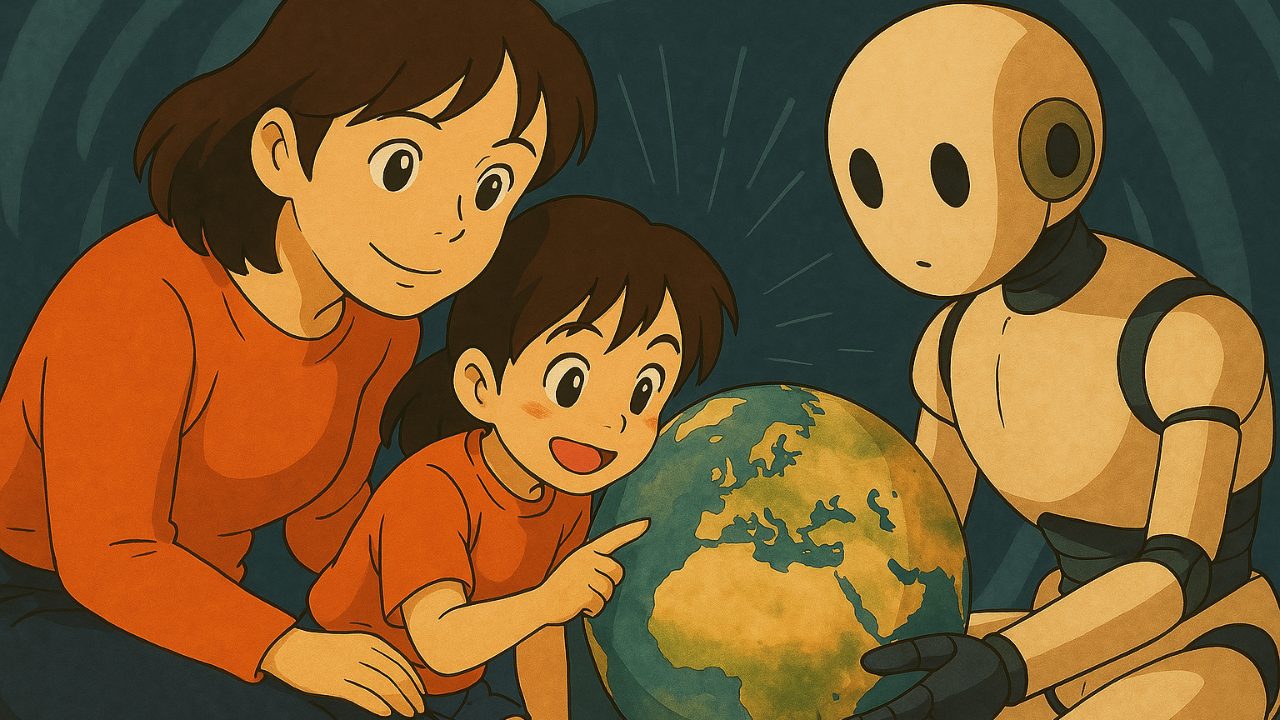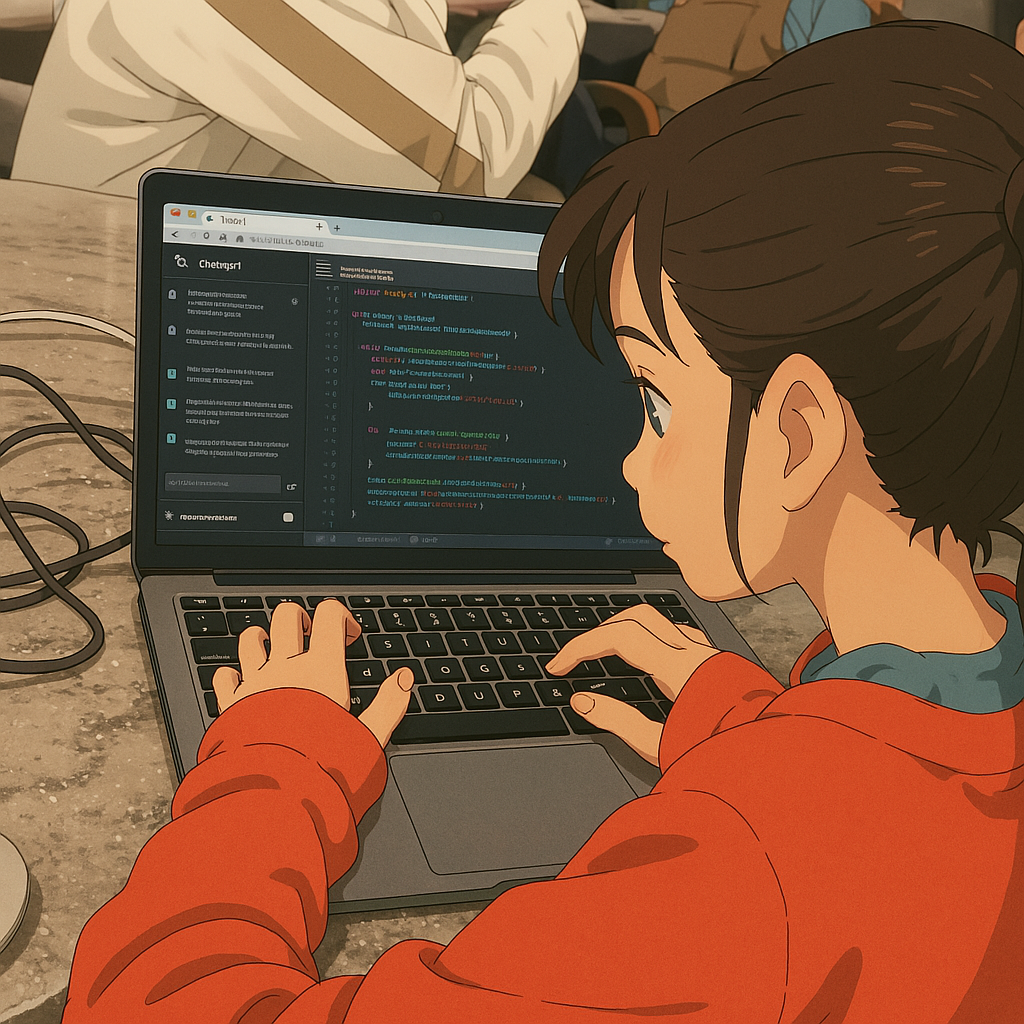
Curiosity Craft: Parenting Beyond Screen Restrictions
Mar 31, 2025There was a time when childhood was bicycles and scraped knees, and the only algorithm that mattered taught you how to climb a tree without falling. Now kids carry a virtual world in their pockets—a world of dazzling possibilities accessed through bright screens that capture attention and pull them away from the physical world.
Jonathan Haidt, in The Anxious Generation, named what many parents have long felt: something fragile has cracked in how children grow up.
Since Haidt’s 2024 book, two instincts have emerged in response to pervasive unease over children’s exposure to technology. One group advocates unplugging completely: no phones until eighth grade, no cell service in schools. Another group believes resistance is futile against technology’s powerful tide, providing their kids with smartphones and iPads at earlier and earlier ages.
But maybe the appropriate answer isn’t a position in a debate. Maybe it’s a movement, a craft, the invention of a new way of using AI in alignment with our goals as parents.
Curiosity Craft: New Practices for a Different Future
Curiosity Craft is a framework for parenting that moves past the binaries of restriction and indulgence. It begins with a simple premise: technology, especially artificial intelligence, can be used to foster deeper human connection, but only if we approach it with intention.
That means parenting not against technology, but through it. It means using tools like AI not as distractions or digital babysitters, but as collaborators in the shared project of cultivating curiosity in our children. This craft requires parents not as gatekeepers or passive observers, but as involved explorers in shared adventures.
And it offers something else too: a path for parents to explore what these technologies can do for their own thinking and reflection. Just as our children are learning to navigate a world with AI, we too are learning to live in it. And we need to do more than cope: we need to shape it.
The Missing Possibility: AI Helping Us Be More Human
Modern parenting has become an exercise in time management, driven by fear that without optimization, children might fall behind. Like Charlie Chaplin’s Modern Times, managing children task-by-task turns their young lives into one more station on the production line.
Yet, genuine connection, such as the resonance felt when a child marvels at a hummingbird or asks profound questions about stars, cannot be scheduled or forced. It must be invited, nurtured within spaces designed for discovery.
What if the problem isn’t technology itself but our relationship with it? Screens aren't inherently isolating; with the right guidance, they can become instruments of exploration, connection, wonder, and meaningful shared experiences within a family.
The Promise of Curiosity Craft
Curiosity Craft is about making technology serve deeper human connections rather than shallow distractions. It means using AI and digital tools intentionally, to spark wonder rather than suppress it.
Here are examples from our own experiments, highlighting how parenting can be meaningfully supported by AI:Curiosity Craft rejects the logic of constant optimization, choosing instead purpose, care, and inspiration. We create the opening for moments where AI can enhance a child’s natural curiosity and engagement in the world.
Examples from Practice
Creating Special Moments: Ocean Storytelling

As parents, we're always looking for ways to spend quality time with our children, constantly needing fresh ideas.
After snorkeling with my 8-year-old daughter, we sat on the shore, still wrapped in salt and sunlight, wondering how to stretch the moment. I turned to ChatGPT and asked, "How can we connect meaningfully with this place?" It suggested gathering objects from the beach and crafting a story infused with local history and culture. Along the way, it offered hints about the possible uses and symbolic meanings of each item. These were details that we never would have discovered on our own. What followed was unscripted and vivid: a co-created story that made the landscape feel alive, and an ordinary afternoon feel unforgettable.
Expanding our Reach: Role Playing with Experts
 Facilitating meaningful learning often requires going beyond our own areas of expertise. When my friend Andrés’s son became curious about online gaming and the dynamics of bullying within it, he wanted to speak to an expert. We didn’t have one on call. But we did have a tool—ChatGPT—which we paired with context drawn from a real interview with the founders of RIOT Games. The result wasn’t a substitute for first-hand expertise, but a bridge.It allowed him to step into a more informed, expansive, and inspiring conversation than we alone could have offered.
Facilitating meaningful learning often requires going beyond our own areas of expertise. When my friend Andrés’s son became curious about online gaming and the dynamics of bullying within it, he wanted to speak to an expert. We didn’t have one on call. But we did have a tool—ChatGPT—which we paired with context drawn from a real interview with the founders of RIOT Games. The result wasn’t a substitute for first-hand expertise, but a bridge.It allowed him to step into a more informed, expansive, and inspiring conversation than we alone could have offered.
Expanding our Skills: The Game Developer

Designing a video game once felt well outside my skill set; it was something for professionals or highly trained developers. But with ChatGPT as a guide, my daughter and I were able to co-create a simple game together. For her, it felt intuitive, even playful. For me, it was revelatory. The tools didn’t replace the need to learn, but they shifted the entry point. What once demanded years of technical expertise now begins with curiosity and conversation. I still want her to understand how code works. But the way she’ll approach it will be fundamentally different: coding not just as a skill to acquire, but as a native mode of expressing ideas.
The Infinite Game of Learning
James Carse’s distinction between finite and infinite games is essential to Curiosity Craft. Finite games are played to win. Infinite games are played to keep playing. Traditional education treats learning as a finite game. It is measured in test scores, credentials, and outcomes. But technology, when approached with curiosity and creativity, offers a shift. It can turn learning into an infinite game. In this game, the goal is to sustain engagement and exploration. Just as my daughter and I co-created a video game using tools I once believed were beyond me, she will grow up with an entirely different starting point. She will see that the act of building, coding, or imagining is not something distant or expert-only, but something woven into everyday life. The path from question to creation is shorter now. The challenge, and the opportunity, is to help our children play that game well, and keep playing.
The Future We Craft
Our children won't inherit our world. They'll inhabit a future more and more intertwined with such technologies. They will be everywhere in their lives.
Curiosity Craft makes technology a partner in wonder rather than a barrier to the world. It transcends the binary choice of embrace or avoidance, cultivating a new ethic of engagement.
This isn't about managing screen time; it's about prioritizing soul time.
Our children will navigate a world of intricate networks and automated voices offering easy distractions. But if we guide them correctly, they'll learn to listen deeply, ask meaningful questions, and explore intentionally. They'll know curiosity isn't a swipe, rather, it’s a posture toward life.
Curiosity Craft equips them to thrive, not drown, in digital waters, turning screens from dead weight into wings, guiding them toward endless possibilities.
Register to receive updates about blogposts and events.
We hate SPAM. We will never sell your information, for any reason.

